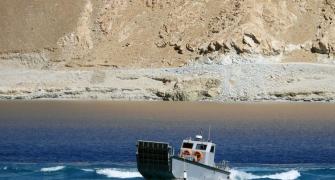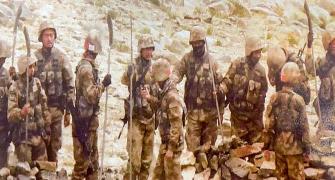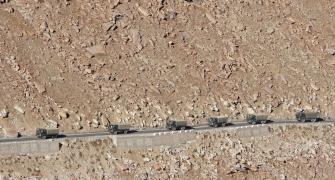'Putting tanks on the Ladakh border is not enough to combat China, what is needed to ensure resilience against any cyber-attacks or attacks in outer space or China flexing its economic muscle, as it did with Australia.'
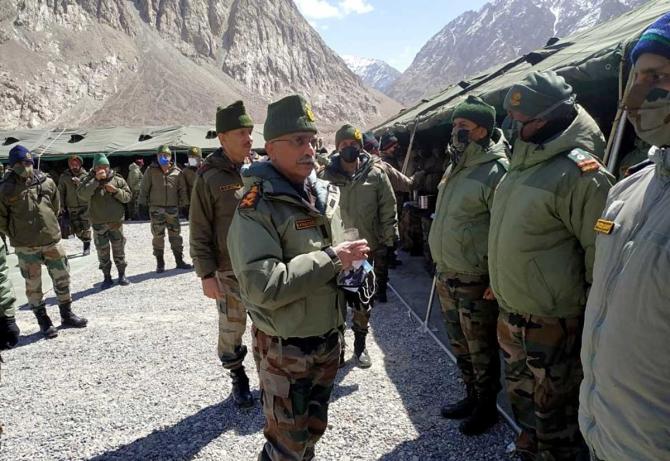
China. You hate it or love it. But you can't ignore it.
The US and many other Western countries might have shown their displeasure by boycotting the Beijing Winter Olympics.
"We seem to be focused too much on military aspects of engagement with China. The real challenge with China is the non-military areas, " Gaurie Dwivedi -- author of Blinkers Off: How Will The World Counter China -- tells Rediff.com's Shobha Warrier.
Do you think the world has so far viewed China with the blinkers on? What is the real China when you take the blinkers off?
The world has been extremely benevolent in its assessment of China and naive in its understanding of what China represents.
Western nations have viewed China as a cheap manufacturing destination that offered enormous offshore economic gains to its companies and a mutual partner in their pursuit of globalisation.
This explains their willingness to embrace a country that was not in compliance with its economic policies and made a mockery of democratic norms.
When the blinkers are taken off, China is a revisionist power that has no regard for international norms or even boundaries.
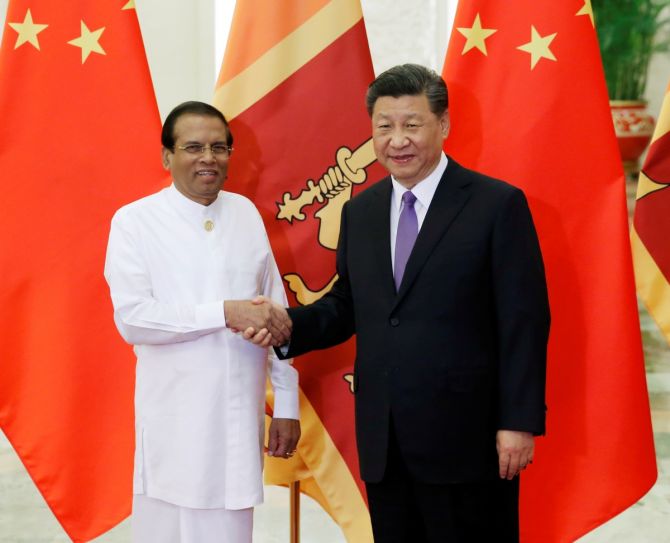
Will the countries where China has its strong footprints -- Sri Lanka, Africa, Pakistan and Russia -- be its allies?
Countries like Pakistan, unfortunately, are so deeply indebted to China that they are unable to choose if they can partner with China on their own terms.
This means that in strategically located countries like Pakistan, China has enormous leverage and will use it for its larger economic and political objectives.
It's a similar issue for nations like Djibouti, Angola and others that have a deep debt to China.
Nations like Sri Lanka and Russia need to be viewed separately.
The Sri Lankan prime minister (Percy Mahinda Rajapaksa) in his previous regime (when he was president) was seen to be too close to China.
It also saw the ownership of the vital Hambantota port being transferred from Colombo to Beijing.
In his current term, there is now a realisation that Colombo needs to exercise caution or it could meet the same fate as Islamabad.
Talking about Russia, it is neither an ally nor a friend and most certainly not a crony of China.
As long the common interest of undermining American presence is met, China and Russia will continue to partner with each other.
Since neither will accept the superiority of other, at some point in time, despite ideological convergence, dynamics between Xi (jinping, China's supreme leader) and (Russian President Vladmir) Putin will witness friction.
Are we going to witness another cold war, the signs of which we have already started seeing, with America and its allies on one side and China and its allies on the other?
We are not in a cold war. We seem to be in a phase that is more than that.
The cold war was about the possibility of a nuclear attack, 2021 has opened the possibility of all sorts of attacks -- biological warfare, cyber warfare, even warfare in outer space.

IMAGE: Gaurie Dwivedi.
You wrote, 'The Belt and Road Initiative became a vehicle to fulfil the ambitions of the CCP and its supreme leader, Xi Jinping, as he looked set to chart out a different roadmap for his country, one that focused not just on expansion and growth; but also on bolder statecraft.' Is it not the most intelligent idea the modern world has seen to colonise poor countries?
Offering connectivity and long-term project finance is not new. Japan does it, so does America and other nations.
China's BRI is about marrying political, economic and technological warfare into a single project.
Politically, China now has deep clout in nations where it has invested.
Economically, since the loans have a period of just 10 years, defaults are bound to happen.
This will translate into China gaining ownership of important projects.
Technologically, since most large scale infra projects either have Chinese hardware or software, it allows China to create a large bank of sensitive data that can be effectively used.
About China's relationship with Europe, you wrote, 'From football teams to strategic infrastructures like ports and airports, China's influence in Europe has grown exponentially in less than two decades'. But will this result in China getting a real hold over Europe?
China has a complete hold over Europe.
It helps that the continent itself does not have a single and coherent policy against China.
For instance, if China does decide to annex Taiwan, what will Europe do?
Will it wait for the US to order NATO troops?
Will the leaders of Germany, the UK and France first convene a meeting amongst each other and then get EU nations on board?
And what if an EU resolution is vetoed by countries like Hungary or Italy?
Such fluidity works for China and Xi Jinping.
In the case of Africa, is it just for the resources that China is there? Are we not seeing real colonisation there with the possibility of Africa becoming China Number 2 in the days to come?
China has already got access to most resources there.
Even the former colonial masters of the continent now lag behind China in investment and loans.
21st-century colonisation is owning resources, physical infrastructure like power plants and critical areas like banking and telecom networks. China has managed all that in Africa.
It's a matter of time before more defaults start and then asset transfers will begin.
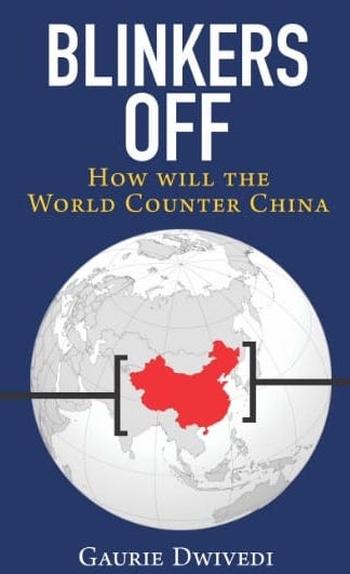
You wrote that 2020 became a watershed year for the world. Is it because the world has become more divided?
2020 was a watershed year because this is the year when the world's blinkers regarding China came out.
China's policies have not changed, it's the world's perception regarding it that has changed.
It brought about a realisation that it's okay to get cheap parts from China, but it's not okay to get Chinese software because it may have spyware or malware that can cripple a country's entire information network.
Do you see China becoming a more influential global player economically and politically than America soon? Could that be the reason behind a book on China?
The reason for the book on China is that we seem to be focused too much on military aspects of engagement with China.
The real challenge with China is the non-military areas.
Putting tanks on the Ladakh border is not enough to combat China, what is needed to ensure resilience against any cyber-attacks or attacks in outer space or China flexing its economic muscle, as it did with Australia.
Feature Presentation: Rajesh Alva/Rediff.com

